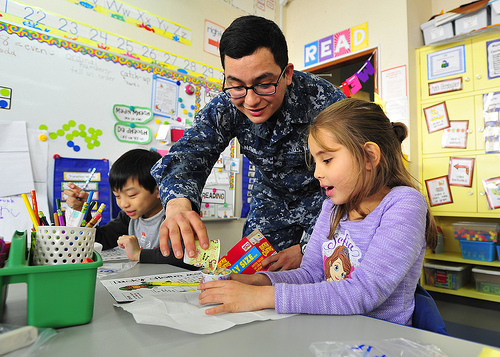18 Reasons the U.S. Education System is Failing

Once upon a time, enthusiasts designed a formal education system to meet the economic demands of the industrial revolution. Fast forward to today and, with the current global economic climate, it seems apparent that the now established education system is unable to meet the needs of our hyper-connected society – a society that is in a constant state of evolution. Let’s examine 18 problems that prevent the US education system from regaining its former preeminence. Check out ExamSnap for all your exam needs.
Parents are not involved enough. Of all the things out of the control of teachers, this one is perhaps the most frustrating. Time spent in the classroom is simply not enough for teachers to instruct every student, to teach them what they need to know. There must, inevitably, be some interaction outside school hours. Of course, students at a socio-economic disadvantage often struggle in school, particularly if parents lack higher levels of education. But students from middle and upper class families aren’t off the hook, either. The demands of careers and an over-dependence on schools put higher-class kids at risk too when it comes to the lack of parental involvement in academics.
- Schools are closing left and right. It’s been a rough year for public schools. Many have found themselves on the chopping block. Parents, students and communities as a whole feel targeted, even if school board members are quick to cite unbiased numbers. There is no concrete way to declare a winner in these cases, either. Sometimes, a school closing is simply inevitable but communities should first look for other solutions. Instead of shutting down underutilized public schools – icons of the community – districts should consider other neighborhood uses, such as a community center or adult education classes. Closing public schools should not be a short-sighted procedure. The decision should focus on the only investment that really matters: a quality public education for all our nation’s children.
- Our schools are overcrowded. The smaller the class, the better the individual student experience. A study by the National Center for Education Statistics found that 14 percent of U.S. schools exceed capacity. At a time where children need more attention than ever to succeed, overcrowded classrooms are making it even tougher to learn and tougher still for teachers to be effective.
- Technology comes with its downsides. I am an advocate for technology in the classroom. I think that ignoring the educational opportunities that technology has afforded us puts kids at a disadvantage. being said, screen culture overall has made the jobs of teachers much more difficult. Education has become synonymous with entertainment in many ways. Parents are quick to download educational games as soon as kids have the dexterity to operate a touch screen, and with the best of intentions. The quick-hit way that children are learning academics before and during their K-12 careers makes it even more difficult for teachers to keep up in the classroom setting, particularly since each student’s knowledge base and technological savvy varies.
- There is a lack of diversity in gifted education. The “talented and gifted” label is one bestowed upon the brightest and most advanced students. Beginning in early elementary grades, TAG programs separate student peers for the sake of individualized learning initiatives. Though the ideology is sound, the practice of it is often a monotone, unattractive look at contemporary American public schools. District schools need to find ways to better recognize different types of learning talent and look beyond the typical “gifted” student model. The national push to make talented and gifted programs better mirror the contemporary and ever-evolving student body is a step in the right direction. Real change happens on a smaller scale though – in individual districts, schools and TAG programs. That progress must start with understanding of the makeup of a particular student body and include innovative ways to include all students in TAG learning initiatives.
- School spending is stagnant, even in our improving economy. As the U.S. economy continues to improve, according to news headlines, one area is still feeling the squeeze from the recession years: K-12 public school spending. A report this month from the Center on Budget and Policy Priorities found that 34 states are contributing less funding on a per student basis than they did prior to the recession years. Since states are responsible for 44 percent of total education funding in the U.S., these dismal numbers mean a continued crack down on school budgets despite an improving economy. If we cannot find the funding for our public schools, how can we expect things like the achievement gap to close or high school graduation rates to rise? It was understandable that budgets had to be slashed when the bottom dropped out of the economy. Now we are in a more stable place, though, it is time to get back to funding what matters most: the education of our K-12 students.
- We are still using the teacher training methods of yesterday. With respect to the students of the past, modern classrooms are full of sophisticated youngsters that show up with a detailed view of the world formed from more than home life experiences. Instant access to information from instant a child can press a touchscreen on a Smartphone and widespread socialization from as young as six weeks old in the form of childcare atmospheres – kids arrive at Kindergarten with less naivety than previous generations. Teachers don’t, in other words, get a clean slate. Instead, they get young minds cluttered with random information and ideas, all of which need fostering or remediating.
- There is a lack of teacher education innovation. It stands to reason that if students are changing, teachers must change too. More specifically, it is time to modify teacher education to reflect the demands of the modern K – 12 classrooms. There are policy and practice changes taking place all over the world – many driven by teachers – that address the cultural shifts in the classroom. Public education in America needs teachers who are better trained to meet the needs of specific student populations, understand the necessary role of distance learning, and are willing to speak up to facilitate classroom change. Without these teachers, effective reform to meet global demand is not possible.
- Some students are lost to the school-to-prison pipeline. Sadly, over half of black young men who attend urban high schools do not earn a diploma. Of these dropouts, too, nearly 60 percent will go to prison at some point. Perhaps there is no real connection between these two statistics, or the eerily similar ones associated with young Latino men. Are these young people bad apples, destined to fail academically and then to live a life of crime? If some of the theories of genetic predisposition are true, perhaps these young men never stood a chance at success and have simply accepted their lots in life. But what if those answers, all of them, are just cop-outs? What if scoffing at a connection between a strong education and a life lived on the straight and narrow is an easy way to bypass the real issues in K-12 learning? Students who are at risk of dropping out of high school or turning to crime need more than a good report card. They need alternative suggestions on living a life that rises above their current circumstances. For a young person to truly have a shot at an honest life, he or she has to believe in the value of an education and its impact on good citizenship. That belief system has to come from direct conversations about making smart choices with trusted adults and peers.
- There is a nationwide college-gender gap, and surprisingly, we are not focusing on it. If you have been following education hot button issues for any length of time, you’ve likely read about the nationwide push to better encourage girls in areas like science, technology, engineering and math (STEM). The thought is that by showing young women that these topics are just as appropriate for them as their male peers, more women will find lasting careers in these traditionally male-dominated fields. I’m all for more women in the STEM workplace but with all this focus in one area, are educators neglecting an even larger gender gap issue? I wonder how much of this trend is based on practicality and how much is based on a lingering social convention that women need to “prove” themselves when it comes to the workforce. Do women simply need a degree to land a job in any field? If so, the opposite is certainly not true for men – at least not yet. Will the young men in our classrooms today have a worse quality of life if they do not attend college – or will it be about the same?
- We still do not know how to handle high school dropouts. It seems that every time the issue of high school dropouts is discussed, it all centers on money. U.S. Census Statistics tell us that 38 percent of high school dropouts fall below the poverty line, compared with 18 percent of total households in every demographic. Dropouts are also 40 percent more likely to rent their residences and spend $450 less per month on housing costs than the overall population. Only around 60 percent of dropouts own vehicles and they spend over $300 less on entertainment annually than average Americans. It’s clear that a high school diploma is in fact the ticket to higher earnings, at least on a collective level. The negative financial ramifications of dropping out of high school cannot be denied, but the way they are over-emphasized seems like a worn-out tactic to me. Instead of focusing on students as earners, we really need to value them as learners so that we can encourage them to finish their high school education.
- We have not achieved education equity. Equity in education has long been an ideal. It’s an ideal celebrated in a variety of contexts, too. Even the Founding Fathers celebrated education as an ideal – something to which every citizen ought to be entitled. Unfortunately, though, the practice of equity in education has been less than effective. Equity, in the end, is a difficult ideal to maintain and many strategies attempting to maintain it have fallen far short in the implementation. To achieve equity, school systems need to have an approach for analyzing findings about recommended shifts in learning approaches and objectives. These approaches should also help teachers and administrators understand not what they have to avoid but what it is that they can do to achieve optimal equity moving forward.
- Technology brings a whole new dimension to cheating. Academic dishonesty is nothing new. As long as there have been homework assignments and tests, there have been cheaters. The way that cheating looks has changed over time, though. Technology has made it easier than ever. Perhaps the most interesting caveat of modern-day cheating in U.S. classrooms is that students often do not think they have done anything wrong. Schools must develop anti-cheating policies that include technology and those policies must be updated consistently. Teachers must stay vigilant, too, when it comes to what their students are doing in classrooms and how technology could be playing a negative role in the learning process. Parents must also talk to their kids about the appropriate ways to find academic answers and alert them to unethical behaviors that may seem innocent in their own eyes.
- We still struggle with making teacher tenure benefit both students and teachers. One of the most contested points of teacher contracts is the issue of tenure. Hardline education reformers argue that tenure protects underperforming teachers, which ends up punishing the students. Teachers unions challenge (among other reasons) that with the ever-changing landscape of K-12 education, including evaluation systems, tenure is necessary to protect the jobs of excellent teachers who could otherwise be ousted unfairly. It can often be a sticking point – and one that can lead to costly time out of classrooms, as recently seen in large school systems like New York City and Chicago. Now, I’m not suggesting that teachers just “give up” but I would support adjusting the expectations for tenure. It seems an appropriate step in the right direction for teachers in all types of schools. That energy then can be redirected towards realistic and helpful stipulations in teachers’ contracts that benefit the entire industry.
- More of our schools need to consider year-round schooling. Does it work? The traditional school year, with roughly three months of vacation days every summer, was first implemented when America was an agricultural society. The time off was not implemented to accommodate contemporary concerns, like children needing “down time” to decompress and “be kids.” The system was born out of economic necessity. In fact, the first schools that went against the summers-off version of the academic calendar were in urban areas that did not revolve around the agricultural calendar, like Chicago and New York, as early as the mid-1800s. It was much later, however, that the idea as a whole gained momentum. Overall, year-round schooling seems to show a slight advantage academically to students enrolled, but the numbers of students are not high enough to really get a good read on it at this point. What does seem clear, however, is that at-risk students do far better without a long summer break, and other students are not harmed by the year-round schedule.
- We are still wrestling the achievement gap. Earlier this month, the U.S. Department of Education released student performance data in its National Assessment for Educational Progress report. The data is compiled every two years and it assesses reading and math achievements for fourth and eighth graders. This particular report also outlines differences between students based on racial and socioeconomic demographics. The data points to the places in the U.S. that still struggle with inequality in student opportunity and performance, otherwise known as the achievement gap. The achievement gap will likely always exist in some capacity, in much the same way that the U.S. high school dropout rate will likely never make it down to zero. This doesn’t mean it is a lost cause, of course. Every student who succeeds, from any demographic, is another victory in K-12 education and it benefits society as a whole. Better recognition by every educator, parent and citizen of the true problem that exists is a start; actionable programs are the next step.
- We need to consider how school security measures affect students. In theory, parents and educators would do anything to keep students safe, whether those students are pre-Kindergartners or wrapping up a college career. Nothing is too outlandish or over-the-top when it comes to protecting our kids and young adults. Metal detectors, security cameras, more police presence in school hallways, gated campuses – they all work toward the end goal of sheltering students and their educators, protecting some of the most vulnerable of our citizens. Emotions aside, though, how much does school security really increase actual safety? Do school security efforts actually hinder the learning experience? It sounds good to taut the virtues of tighter policies on school campuses but is it all just empty rhetoric? Given the fact that state spending per student is lower than at the start of the recession, how much should schools shell out on security costs? Perhaps the best investment we can make to safeguard our students and educators is in personal vigilance. Perhaps less reliance on so-called safety measures would lead to higher alertness.
- We need to make assistive technology more available for students with disabilities. A key to improving the educational experience for students with disabilities is better accommodations in schools and continued improvements in assistive technology. Assistive technology in K-12 classrooms, by definition, is designed to “improve the functional capabilities of a child with a disability.” While the word “technology” automatically conjures up images of cutting-edge electronics, some assistive technology is possible with just simple accommodations. Whether high-tech or simple in design, assistive technology has the ability to transform the learning experiences for the children who benefit. Assistive technology is important for providing a sound education for K-12 students with disabilities but benefits the greater good of the country, too. Nearly one-fourth of a specific student population is not being properly served and with so many technological advances, that is a number I believe can drop. Assistive technology in simple and complex platforms has the ability to lift the entire educational experience and provide a better life foundation for K-12 students with disabilities.
Some of these reasons are well-known and long-standing issues. However, others—such as the emergence of a screen culture—are new and even somewhat unexpected challenges. However, the nature of each issue does not matter. All of them are standing in the way of our becoming globally competitive.
Can you think of any reasons the U.S. educational systems are failing?
Click here to read all our posts concerning the Achievement Gap.




